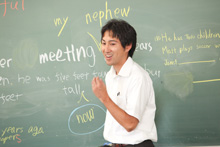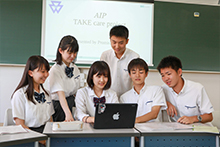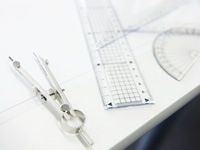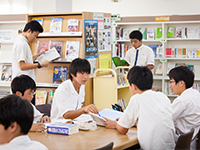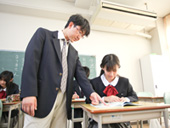Time Schedule for Each Grade
Our school allocates more time to the main five subjects.The unique curriculum is sequentially organized throughout 6 years.
Besides the basic textbooks and exercise books, we adopt various experiments, research presentations and our original textbooks and pursue an effective and intellectual curiosity filled education.
Educational Process
Characteristic of Course Instruction
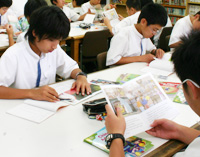
Extensive Reading Method
for Mastering Speed Reading Skill
English Class
Our English literacy program is designed to develop the four main skills (reading, listening, writing and speaking) for both junior high school and high school students.At the junior high school, a class is divided into two and taught “global understanding” by the English native teachers. Moreover, the extensive reading is also adopted from the second grade of junior high school. Students can select their own reading materials, such as mystery novels, comedy, scientific fiction and human drama, etc. Reading English without Japanese translations develops their comprehension skills. The curriculum for the high school is well-balanced and consists of reading, listening, writing and speaking. It is also designed to develop their skills in order to pass entrance exams for high competitive universities.
Mathematics Class
Developing calculation abilities is necessary for creating productive thinking skills. The program for lower and middle grades intensifies calculation trainings and basic comprehension. The lessons for upper grades focus on training argumentation and presentation.
Many mathematics teachers support both in class and out of class learning. Also our original textbooks are designed to help students pass entrance exams to competitive universities and to help students maximize their abilities.
Japanese Class
The program for junior high school places a high value on activities concerning "words". We promote activities including, looking into the dictionary or writing composition which help students to acquire “vocabulary” and "expression skills. "The curriculum for high school students is designed to acquire “general comprehension” and “expression skills" and it is also applicable for passing entrance exams to competitive universities.
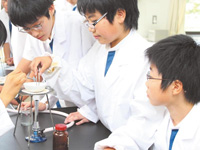
Stimulating "Intellectual Curiosity"
by Various Experiments Based Lessons
Science Class
Physics, chemistry, biology, geology classes start from junior high school. A specialized teacher for each subject is assigned and conducts lessons focusing on experiments. The experiment based lesson sufficiently draws students' "interest" and helps to develop their "thinking skills."
The lessons for high school students include more specialized contents and stimulate their "intellectual curiosity". The curriculum is not only designed for passing competitive university entrance exams, but also students can experience "thinking skills" and show an "interest in science".
Social Study Class
The social studies program is comprised of 3 categories, geography, history and civics, and each class includes technically specialized contents.1st grade students in junior high school study geography and civics. 2nd and 3rd grade students study history and geography.
Not only do they acquire basic knowledge, but are also encouraged to conduct research and report topics of interest, thus enhancing their "presentation skills." The compulsory subjects for 1st grade of high school are modern society, geography and world history. And 2nd and 3rd grade in the arts course select 2 subjects from world history, Japanese history and geography. Students in the science course select 1 subject among them. Studying various subjects for several years will sufficiently improve their academic abilities and allow them to pass Japan's National Center Examinations and gain entry into select competitive universities.
Regular and Follow-Up Lesson
Nishiyamato Gakuen attaches a high value to ensuring the acquisition of daily lesson content, not to improving special test skills for entrance examinations. According to our educational motto, we do not leave any students without comprehension, and we organize a well-prepared follow-up system.















